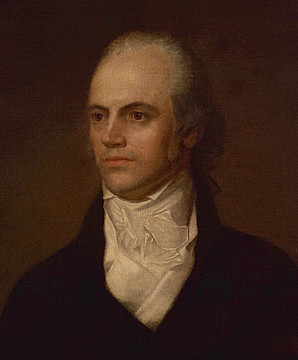Aaron Burr (1756-1836)
3rd Vice-President of the United States; Attorney-General & U.S. Senator, New York
He was born at Newark, New Jersey, and graduated from Princeton University in 1772. During the Revolution, he took part in Benedict Arnold's ill-fated expedition to Quebec. After graduating from Litchfield Law School he went to New York City. He served in the New York State Assembly and in 1789 George Clinton appointed him New York State Attorney General. In 1791, he defeated Philip Schuyler to become U.S. Senator from New York, serving until 1797. He ran for President of the United States in 1796, coming fourth. In 1799, he founded his own bank, the Manhattan Bank which he used to promote Democratic-Republican power and influence. From 1801 to 1805, he served as the 3rd Vice-President of the United States under Thomas Jefferson, however Jefferson never trusted him and kept him on the outside of party politics.
Colonel Burr's name is forever engrained into history as the man who shot Alexander Hamilton dead in a duel, immediately making him one of the most hated men in American history. To escape the ensuing fallout, Burr was rumored to have holed up at Lindenwald, the estate later associated with President Martin Van Buren. Having run for Governor of New York in 1804 and lost to the relative outsider Morgan Lewis, Burr blamed the defeat on a smear campaign and debts forced him to sell his mansion, Richmond Hill. After completing his term as Vice-President he went west where he leased 40,000-acres in Louisiana and tried to drum up support both locally and in Britain to establish his own independent colony. In 1807, he was tried for treason, but despite Jefferson's best efforts he was acquitted. Nonetheless, it marked the end of his political career and in 1808 his friend David Hosack lent him money to buy passage to Europe to escape his creditors. There, he travelled extensively but based himself at 30 Craven Street, London.
When he returned to America in 1812, he used the name "Edwards" to continue to evade his creditors until he was able to resume his legal practice in New York. Despite his setbacks, he lived relatively comfortably and in 1833 married a wealthy widow 19-years his junior, Eliza Jumel, briefly making his home with her at the Morris-Jumel Mansion, but died that same year. He was married twice. His first wife died and his second divorced him when she realized his debts were rapidly consuming her fortune. The divorce was finalised on the same day that he died. He was the father of four children (three of whom lived to adulthood), two by his first wife's Indian servant from Calcutta, Mary Emmons.
Colonel Burr's name is forever engrained into history as the man who shot Alexander Hamilton dead in a duel, immediately making him one of the most hated men in American history. To escape the ensuing fallout, Burr was rumored to have holed up at Lindenwald, the estate later associated with President Martin Van Buren. Having run for Governor of New York in 1804 and lost to the relative outsider Morgan Lewis, Burr blamed the defeat on a smear campaign and debts forced him to sell his mansion, Richmond Hill. After completing his term as Vice-President he went west where he leased 40,000-acres in Louisiana and tried to drum up support both locally and in Britain to establish his own independent colony. In 1807, he was tried for treason, but despite Jefferson's best efforts he was acquitted. Nonetheless, it marked the end of his political career and in 1808 his friend David Hosack lent him money to buy passage to Europe to escape his creditors. There, he travelled extensively but based himself at 30 Craven Street, London.
When he returned to America in 1812, he used the name "Edwards" to continue to evade his creditors until he was able to resume his legal practice in New York. Despite his setbacks, he lived relatively comfortably and in 1833 married a wealthy widow 19-years his junior, Eliza Jumel, briefly making his home with her at the Morris-Jumel Mansion, but died that same year. He was married twice. His first wife died and his second divorced him when she realized his debts were rapidly consuming her fortune. The divorce was finalised on the same day that he died. He was the father of four children (three of whom lived to adulthood), two by his first wife's Indian servant from Calcutta, Mary Emmons.














